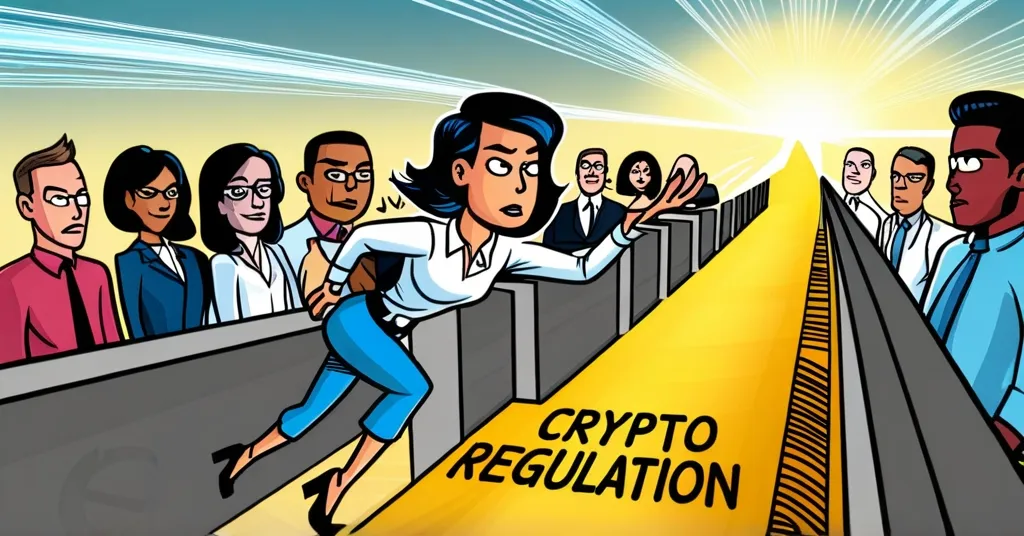SEC Launches Crypto Task Force: Hester Peirce Leads Charge for Clarity

SEC’s Crypto Task Force: A New Dawn for Crypto Regulation
The U.S. Securities and Exchange Commission (SEC) has launched a Crypto Task Force website, a significant move led by Commissioner Hester Peirce to address the regulatory confusion that has long clouded the cryptocurrency industry. This initiative aims to provide clearer guidelines and rectify past regulatory shortcomings, signaling a shift towards a more collaborative and innovative approach.
- SEC’s Crypto Task Force seeks public input and regulatory clarity
- Hester Peirce, “Crypto Mom,” leads the initiative
- Task force to define crypto securities and consider relief for token issuers
- Collaboration with other regulators and international bodies planned
With the departure of former SEC Chair Gary Gensler, known for his enforcement-heavy approach, the crypto community sees a glimmer of hope in Hester Peirce, affectionately dubbed “Crypto Mom.” Under her leadership, the SEC aims to chart a new course, as Peirce poignantly remarked,
“We refused to use the tools we had, slammed on the enforcement brakes too often, and dragged the industry down a winding road with no clear destination.”
Her vision is clear:
“We want a destination where builders can experiment without fear, but where fraudsters have no place to hide.”
One of the task force’s primary objectives is to define which crypto assets are classified as securities. Crypto securities are digital assets that are considered investments and, thus, fall under securities regulations. This classification will provide much-needed legal clarity to the industry. Additionally, the task force is exploring temporary relief measures for token issuers—those who launch new cryptocurrencies. This relief would allow projects to operate without immediate legal scrutiny, provided they offer accurate disclosures and cooperate with regulators. It’s like giving them a chance to sort out their paperwork before the regulatory storm hits.
The SEC isn’t just stopping at domestic efforts. They’re planning to work with other regulators like the Federal Deposit Insurance Corporation (FDIC) and the Commodity Futures Trading Commission (CFTC) to avoid regulatory overreach and develop a cohesive framework. Internationally, the task force is considering cross-border sandboxes, which are regulated environments where companies can test new financial products across different countries. Think of it as a playground where crypto projects can experiment without getting into too much trouble.
On the investment front, the SEC is revisiting registered token offerings and considering adjustments to existing frameworks. They’re also developing custody solutions for investment advisers—think of it as a secure vault for holding your digital assets. For those involved in crypto-lending and staking programs, new guidance is on the horizon. And let’s not forget about crypto ETFs; the task force is reviewing these products and considering the inclusion of staking within them, which could be a game-changer for institutional investors.
Throughout this process, the SEC remains steadfast in its commitment to investor protection and market integrity. As Peirce put it,
“We’re rewriting the rulebook while driving down the highway. But at least now, we have a map.”
The task force will not endorse any specific crypto products, tokens, or coins, focusing instead on creating a balanced environment that supports innovation while safeguarding investors.
The emotional toll of regulatory uncertainty on investors cannot be overstated. Clear and consistent regulation isn’t just about financial metrics; it’s about restoring confidence in a market that has often been left in the dark. Legislative efforts like the Financial Innovation and Technology for the 21st Century Act (FIT21) and the Guiding and Establishing National Innovation for US Stablecoins (GENIUS Act) further underscore the urgency of establishing a comprehensive digital asset framework.
From a Bitcoin maximalist perspective, this development could be a boon. Bitcoin, as the pioneer in the crypto space, stands to benefit greatly from clearer regulations. A more defined regulatory environment could enhance Bitcoin’s role as a store of value and a hedge against traditional financial systems, while also encouraging broader adoption.
However, it’s not all sunshine and rainbows. Some might argue that the SEC’s new approach could still lead to over-regulation, potentially stifling innovation. There’s also the challenge of ensuring that the task force’s efforts truly translate into actionable, clear guidelines. We need to keep a close eye on how these initiatives unfold, balancing our optimism with a healthy dose of skepticism.
In a world where Bitcoin and blockchain technology promise to revolutionize finance, the SEC’s new Crypto Task Force is a beacon of hope. It’s a step towards a future where decentralization, freedom, and privacy can flourish, disrupting the status quo and accelerating the financial revolution. But let’s not get too carried away with optimism; the road ahead is paved with challenges and risks that we must navigate with both enthusiasm and caution.
Key Questions and Takeaways
- What is the main goal of the SEC’s Crypto Task Force?
The primary goal is to provide regulatory clarity and clean up past regulatory issues, balancing innovation with investor protection.
- How will the task force engage with the public?
It will invite public input through a website where individuals can request meetings or submit written comments.
- What are the initial focuses of the task force?
The task force will first define which crypto assets qualify as securities and explore temporary relief measures for token issuers.
- How does the task force plan to collaborate with other regulators?
It will work with regulators like the FDIC and CFTC to avoid regulatory overreach and develop a comprehensive regulatory framework.
- What measures are being considered for token issuers?
The task force is considering retroactive relief, allowing token projects to operate without immediate legal scrutiny if they provide accurate disclosures and cooperate.
- What role will international collaboration play?
The task force will work with global regulators to address cross-border risks and opportunities, potentially establishing cross-border sandboxes.
- How will the SEC approach crypto ETFs and staking?
The SEC will review crypto ETFs, provide transparent criteria for approval, and consider allowing staking within these products.
- What is the SEC’s stance on endorsing crypto products?
The SEC will not endorse any tokens, coins, or products, maintaining a focus on investor protection and market integrity.



